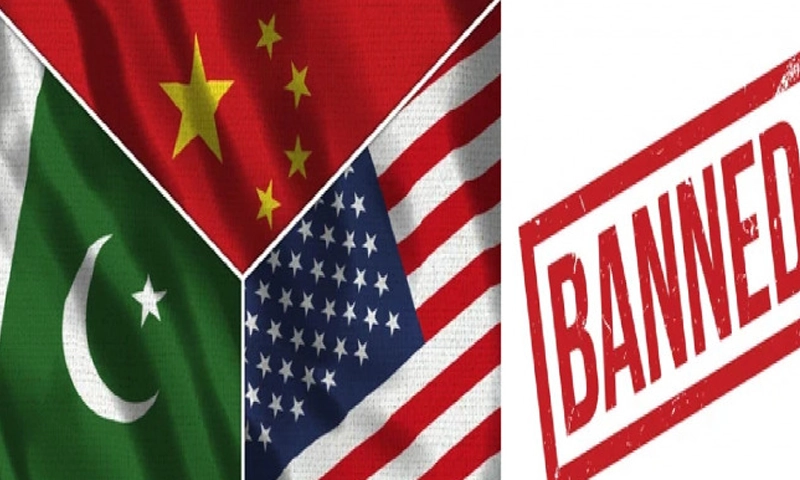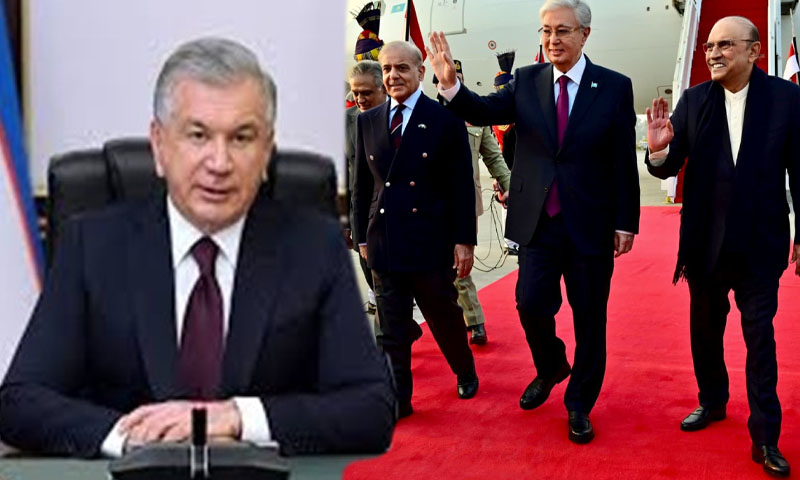- Web Desk
- Today
US adds Pakistan firms to export control list — what are the consequences?
-

- Web Desk
- Mar 27, 2025

ISLAMABAD: The United States has added 80 firms and institutes from Pakistan, China and four other countries to its export control list to prevent the US technologies and goods from being “misused” for missiles and other military activities, the US Commerce Department.
According to a New York Times report, the Trump administration has added 54 companies and organisations from China to the Commerce Department’s Entity List, as well as more than two dozen from Iran, Pakistan, South Africa, the United Arab Emirate (UAE) and Taiwan.
“The added entities had made contributions to Pakistani nuclear activities and its missile program, advanced China’s quantum technology capabilities and hypersonic weapons development, and tried to circumvent US controls on Iran, among other actions,” the administration said.
Among the sanctioned companies, 19 are from Pakistan, 42 from China, and 4 from the UAE, while others belong to Iran, France, Africa, Senegal, and the United Kingdom.
The US government claims that these entities are operating against US national security and foreign policy interests.
Pakistan’s Response
Responding to the US sanctions on 19 Pakistani companies, Foreign Office spokesperson Shafqat Ali Khan termed the move “unilateral and baseless.”
In a weekly briefing on Thursday, Khan said that the sanctions imposed on Pakistan’s commercial companies were one-sided and lacked evidence.
This is not the first time the US has sanctioned companies from Pakistan and other countries, citing national security concerns.
In April 2024, the US sanctioned three Chinese companies and one Belarusian firm, alleging their involvement in Pakistan’s missile programme.
In December 2021, 13 Pakistani companies were blacklisted over alleged assistance in Pakistan’s nuclear and missile programmes.
In 2018, seven Pakistani engineering firms were placed under strict surveillance, as the US accused them of involvement in nuclear equipment trade.
Pakistani Companies Facing US Sanctions
The 19 sanctioned Pakistani companies include Allied Business Concern Pvt Ltd, Ariston Trade Links, Brittle Light Engineering Company, Global Traders, Indentec International, Intra Link Incorporated, Linkers Automation Pvt Ltd, NA Enterprises, Auto Manufacturing, Potohar Industrial & Trading Concern, Proc Master, Professional Systems Pvt Ltd, Rachna Supplies Pvt Ltd, and Rustec Technologies.
These sanctions add to previous US actions against Pakistani entities, further straining bilateral trade relations.
According to a report by the Bureau of Industry and Security (BIS) of the US Department of Commerce, the primary reason for adding these Pakistani companies to the Entity List is their alleged involvement in supporting Pakistan’s nuclear and ballistic missile programmes.
Also read: US religious freedom panel urges sanctions against Indian external spy agency
A document released by the Bureau of Industry and Security states that these companies are now banned from purchasing technology, equipment, or software from the US and will face difficulties conducting business in American markets.
Some companies on the list are accused of assisting nuclear activities, while others are alleged to have supported missile technology development.
According to the US Department of Commerce, companies linked to Pakistan’s nuclear program are accused of trading sensitive nuclear technology and materials, while those associated with the missile program are allegedly supplying key components and essential equipment for Pakistan’s ballistic missile programme.
According to the US Department of Commerce, these firms were allegedly providing critical technology and equipment to Pakistan’s unregulated nuclear programme.
These companies are accused of supplying sensitive components and technology that could contribute to the advancement of Pakistan’s missile programme.
Impact of US Sanctions on These Companies
Under US law, these companies now require a special license to import any technology, equipment, or materials from the US. However, the Bureau of Industry and Security has stated that license applications will be reviewed under a “presumption of denial” policy, meaning approvals are highly unlikely.
This is not the first time that Pakistani companies have been added to the Entity List. In December last year, the US imposed sanctions on Pakistan’s state-run National Defence Complex, which is responsible for Pakistan’s missile systems.
Over the years, the US has repeatedly sanctioned several Pakistani companies, alleging their involvement in the country’s nuclear and missile programmes, and restricting their ability to procure equipment, materials, and components.
What Do These Sanctions Mean for Pakistan?
Analysts believe these sanctions will limit the global business capabilities of the affected companies and make it extremely difficult for them to acquire advanced US technology and equipment.
Once placed on the Entity List, these companies can no longer purchase any US-made components, software, or machinery.
Additionally, if a foreign company sells products containing US-origin technology to these firms, it may also violate US laws.
This means that these companies will face difficulties not just in the US market but also globally, as many European and Western companies follow American regulations.
The continuous imposition of sanctions poses a challenge for Pakistan, particularly in defence, industrial, and technological sectors, which already rely on foreign suppliers.
Although Pakistan says its missile programme is “indigenous”, further US restrictions could create economic and diplomatic challenges on the global stage.
Frequent US sanctions will not only harm the businesses of these companies but could also complicate Pakistan’s defence industry.
Diplomatic Challenge for Pakistan
Analyst Amir Zia believed that this issue also has a diplomatic dimension. He warned that these sanctions could strain US-Pakistan relations even further.
“These sanctions show that the US is closely monitoring Pakistan’s strategic programmes,” he says. Pakistan should diplomatically address these concerns and demonstrate transparency to improve its global image.
However, he also argued that these sanctions are not surprising, given the long-standing US policy of supporting India as a strategic partner since the George W Bush era.
“In today’s geopolitical landscape, there are more divergences than shared interests in US-Pakistan relations.”
Amir Zia further suggested that the US aims to strengthen India in the region while ensuring that Pakistan does not develop advanced defence capabilities.
“This is part of a larger US policy to contain Pakistan’s missile and nuclear programs. The US is willing to go to great lengths to achieve this, and we are seeing clear signs of this strategy.”
Does US View Pakistan as an Unstable State?
Amir Zia also said that the US perceives Pakistan as an unstable state, citing concerns over terrorism, internal conflicts, and governance issues.
“This instability gives the US more leverage to pressure Pakistan, which is why the scope of bilateral relations continues to shrink.”
He warns that these sanctions could further isolate Pakistan internationally and provide an opportunity for critics and adversaries to push their narratives against the country.
“The criticism of Pakistan’s military, which was once mainly voiced by foreign powers, is now growing within Pakistan itself. This could lead to further challenges in the near future.”
According to him, Pakistan is becoming an easier target for external forces.
“While the US may no longer see Pakistan as strategically important, the US remains crucial for Pakistan, particularly as a major export market.”
How Can Pakistan Overcome This Situation?
The key question is: how can Pakistan navigate this situation and maintain effective diplomatic ties with the US.?
Defense analyst Syed Muhammad Ali offered a different perspective. He argued that this issue should not be viewed solely in the context of Pakistan, but rather as part of global politics and power dynamics.
He asserted that Pakistan’s missile and nuclear programmes are entirely indigenous, developed by Pakistani scientists, engineers, and research institutions.
“These programmes have been developed based on Pakistan’s unique security needs, with no direct foreign involvement.”
He believes that US sanctions will not affect Pakistan’s defence programme, as Pakistan does not rely on US technology for its missile development.
“The impact of these sanctions will be limited, as Pakistan’s defence sector is self-sufficient in critical technologies.”
Is China the Real Target?
Syed Muhammad Ali argued that these sanctions are not just about Pakistan, but part of a broader US strategy aimed at China.
“This is not an isolated action against Pakistan but rather part of a larger global strategy. The US is currently focused on restricting China’s technological and trade advancements, and Pakistan is simply a secondary target in this larger conflict.”
He noted that these sanctions have also been imposed on companies in the UAE, China, and Taiwan, suggesting that the real goal is to curb defense and technological cooperation with China.
“It’s significant that even US allies like the UAE and Taiwan have faced similar sanctions, reinforcing that China — not Pakistan — is the primary target of these restrictions.”
China has already strongly criticized the US move.
Syed Muhammad Ali believed that the US is using economic sanctions, trade restrictions, and technological barriers as strategic weapons against China, and Pakistan is caught in the crossfire.




